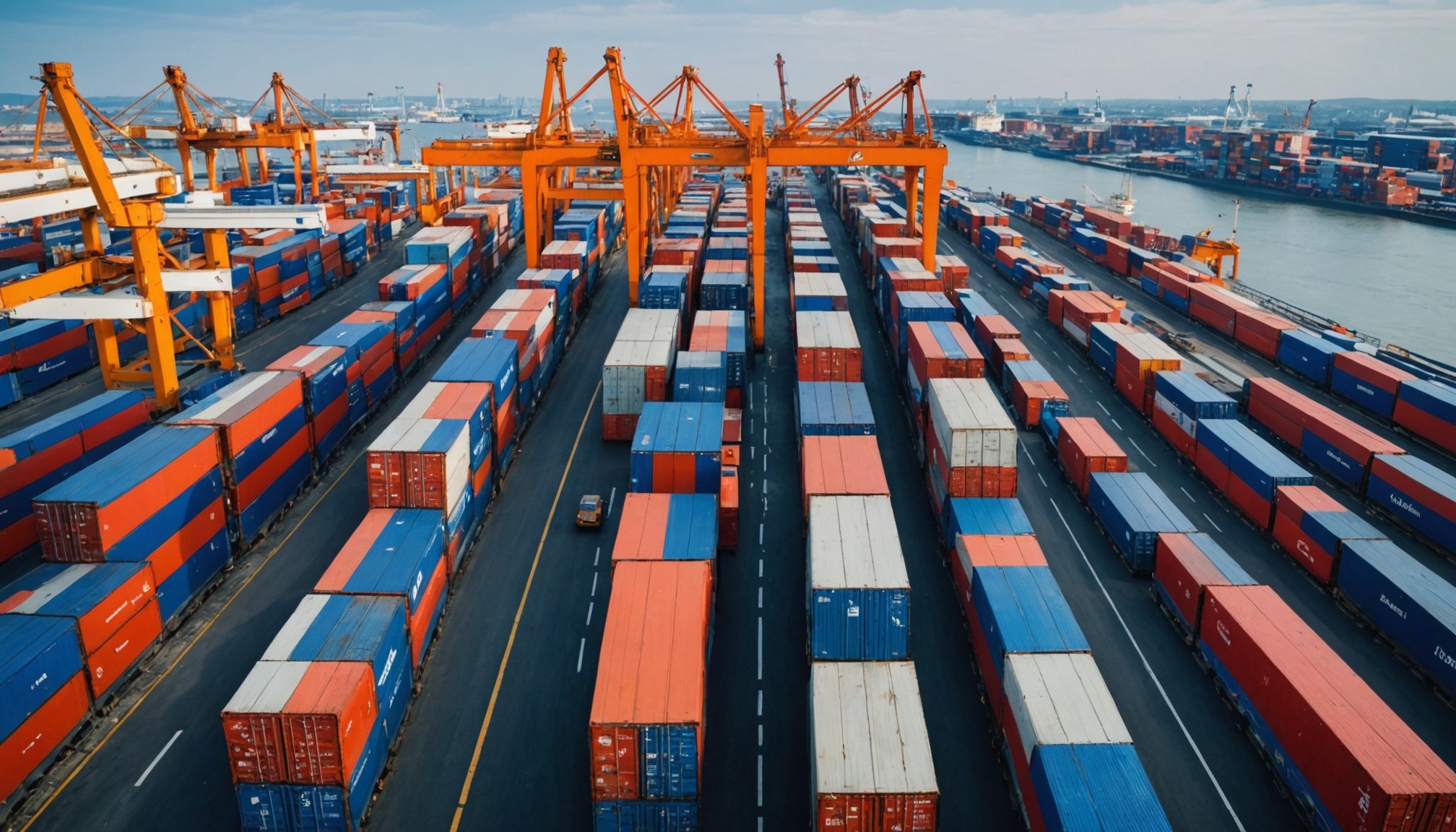Understanding Supply Chain Resilience
Supply chain resilience is a critical facet of modern business, focusing on the ability to anticipate, prepare for, respond to, and recover from disruptions. In the UK context, the importance of supply chain resilience has been underscored by a series of recent disruptions, including Brexit’s regulatory changes, the COVID-19 pandemic’s logistical constraints, and geopolitical tensions.
The UK’s supply chains have experienced significant strain, presenting unique challenges. Businesses face hurdles such as fluctuating demand, interrupted supply routes, and increased costs. Resilience demands adaptive strategies to manage these volatile conditions effectively.
This might interest you : Maximizing productivity: harnessing data analytics to revolutionize production in uk breweries
A resilient supply chain can ensure business continuity by maintaining service levels despite external pressures. In the UK, companies are reevaluating their suppliers and logistics networks to enhance their operational robustness. Recent disruptions have highlighted vulnerabilities, pushing firms to diversify suppliers and invest in more adaptable infrastructure.
Integrating proactive measures like continuous risk assessment and developing contingency plans is paramount. By addressing these challenges effectively, businesses can transition from reactive to proactive resilience approaches, safeguarding against unforeseen future events. This shift offers a pathway towards stable and sustainable growth in the face of inevitable disruptions.
Additional reading : Maximize Your Small Business Success: The Comprehensive Guide to Streamlined Inventory Management Solutions in the UK for Improved Efficiency!
Risk Assessment Strategies for Supply Chains
Conducting a comprehensive risk assessment is essential for maintaining supply chain resilience. In a landscape prone to disruptions, identifying and understanding vulnerabilities is crucial. Companies can deploy vulnerability analysis to pinpoint potential weaknesses within their supply chain, such as supplier dependencies or logistics bottlenecks.
Effective risk assessments often include several key considerations. These involve mapping the entire supply chain, evaluating supplier risks, assessing logistical routes, and understanding geopolitical influences. By scrutinising these areas, businesses can create a robust picture of their operation’s weak points.
Disruption management plays an integral role as well. Implementing systematic tools and methodologies, such as scenario planning and stress testing, helps predict possible disruption impacts. Companies might also utilise digital tools like supply chain visualisation software to enhance their ability to foresee and manage risks proactively.
By employing these strategies, organisations can better prepare for uncertainties, mitigating negative effects on their operations. This comprehensive approach not only strengthens resilience but ensures a more agile and responsive supply chain framework, capable of withstanding future challenges effectively. With proper risk assessment and management in place, businesses stand at the ready to tackle the unpredictable nature of modern supply chains.
Leveraging Technology for Enhanced Resilience
Embracing technology integration is critical in fortifying supply chains against disruptions. Digital solutions such as blockchain, IoT, and AI enable real-time tracking, predictive analytics, and effective data management, thereby enhancing decision-making processes. These technological advancements collectively contribute to robust supply chain innovation by increasing transparency and efficiency.
Frequently, case studies illustrate successful technology integration within UK supply chains. For example, a multinational retailer implemented IoT devices across its inventory management systems, significantly improving stock accuracy and reducing wastage. Such case studies underscore the transformative potential of digital innovations in crafting resilient supply networks.
Emerging technologies further promise to reshape resilience paradigms. Machine learning algorithms can predict demand shifts and supply interruptions, while blockchain fosters secure and transparent transactions. The adoption of these tools provides strategic advantages, ensuring continuity amidst uncertainties.
Integrating digital solutions allows businesses to proactively navigate challenges. With advanced technologies at their disposal, organisations are better positioned to mitigate risks, adapt swiftly to change, and maintain seamless operations. Leveraging these innovations keeps companies at the forefront of supply chain resilience, capable of facing both present and future challenges with confidence.
Strengthening Supplier Collaboration
Building strong supplier relationships is crucial for enhancing supply chain resilience. Establishing robust collaborations ensures a reliable flow of goods and information, allowing businesses to better navigate uncertainties.
Collaboration strategies serve as a foundation for effective supplier relationship management. Initiatives such as regular communication, performance reviews, and shared goals significantly improve mutual trust. Companies in the UK context often develop formal agreements and transparent processes to streamline interactions, which fosters a resilient supply chain.
Partnerships based on shared interests and transparency are instrumental. For example, a UK food retailer revisited its supplier engagement strategy, transitioning from transactional to partnership-based agreements. This shift enabled joint problem-solving and innovation, leading to improved efficiency and reduced disruptions.
Successful UK market partnerships highlight the importance of collaboration. An automotive manufacturer partnered with suppliers to implement just-in-time inventory, ensuring smooth operations despite external disturbances. Such practices illustrate that adaptive and communicative relationships are key to achieving resilience.
In conclusion, supplier relationship management through strategic collaboration strategies is vital. By prioritising communication and mutual goals, businesses can enhance their resilience. Cultivating strong partnerships ensures reliability and continuity, even when faced with unforeseen challenges.
Sustainability as a Component of Resilience
Linking sustainable practices to supply chain resilience offers an insightful perspective, showcasing how environmental commitments bolster long-term viability. Incorporating sustainable resilience strategies can mitigate various supply chain risks by fostering adaptability and reducing dependencies on vulnerable resources.
In the UK supply chain, integrating sustainability is multifaceted. Businesses are prioritising eco-friendly logistics, regenerative sourcing, and waste minimisation, aiming not only to lessen environmental impact but to also solidify resilience. For instance, statistically, organisations implementing sustainable practices have experienced fewer disruptions, given their emphasis on local sourcing and renewable resources, reducing exposure to global supply shocks.
Moreover, the push towards a sustainable supply chain often necessitates comprehensive audits of environmental impacts, leading companies to adopt greener manufacturing processes and distribution networks. Consequently, this reduces carbon footprints while simultaneously constructing a more resilient operational framework.
Applying statistical insights, companies adopting sustainability have reported marked improvements in operational stability. As UK firms embrace these practices, they contribute not only to ecological preservation but also to enhanced supply chain endurance. The evidence portrays sustainability as indispensable in the continuity of resilient supply networks, ensuring preparedness against future challenges.
Practical Implementation Tools and Frameworks
Strengthening supply chain resilience requires well-designed implementation tools and frameworks. In the UK context, businesses can utilise a range of methodologies to bolster their resilience strategies effectively.
One such framework is the Supply Chain Operations Reference (SCOR) model, which offers a comprehensive blueprint for operational enhancement. It aligns seamlessly with UK market needs by providing standard processes and performance metrics crucial for resilience.
Digital solutions can greatly enhance the effectiveness of these frameworks. Tools like supply chain management software enable companies to monitor operations in real time, identify potential risks, and streamline workflow. For UK firms, leveraging local resources or cloud-based systems increases agility and minimises disruptions.
Implementing step-by-step action plans ensures long-term resilience. Key steps include:
- Assessing current vulnerabilities
- Engaging stakeholders in strategic discussions
- Creating a clear response framework
Understanding and integrating the appropriate tools and frameworks aligns businesses with not only present demands but also future challenges. By proactively managing risks and embedding resilience into daily operations, companies ensure sustainability and robustness across their supply networks, preparing confidently for future uncertainties.
Case Studies and Expert Insights
Examining real-world case studies provides invaluable insights into achieving robust supply chain resilience. UK-based companies have demonstrated remarkable adaptability in the face of recent disruptions, offering lessons that are both practical and applicable across various industries. For instance, a prominent UK retailer managed to maintain stable operations through strategic supplier diversification and technology integration, ensuring minimal disruption.
Experts highlight that building redundancy into supply chains—such as maintaining multiple suppliers for key components—enhances resilience significantly. Embracing digital tools like AI and blockchain can further streamline operations, providing transparency and predictive capabilities. This technology integration not only optimises logistical flows but also strengthens the ability to anticipate and mitigate potential issues before they materialise.
Insights from such experiences underscore the importance of ongoing collaboration with partners and continuous improvement in resilience strategies. These stories convey that preparation and adaptability are cornerstones of a resilient supply network. Real-world examples serve as a testament to the effectiveness of enacting comprehensive resilience plans, reinforcing the notion that proactive efforts are crucial to confronting and overcoming supply chain challenges adeptly.











